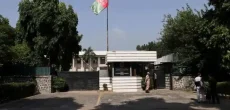[vc_row][vc_column][vc_column_text dp_text_size=”size-4″]ISLAMABAD – The Chief Justice of the Supreme Court, Qazi Faez Isa, responded on Saturday to a letter from Imran Khan, the leader of the Pakistan Tehreek-e-Insaf (PTI), who sought a fair electoral environment for his party ahead of the upcoming general elections on February 8.
Chief Justice Isa’s Secretary, Dr. Mushtaq Ahmad, conveyed that the top judge is fully aware of his constitutional responsibilities and will not succumb to pressure or show favoritism to any party.
Read more : Letter To Chief Justice Isa On Hassan Niazis Disappearance
Imran Khan had raised concerns about the arrests and filing of cases against PTI leaders and workers, urging the chief justice to take notice of the alleged “discrimination” against his party.
The statement issued by the chief justice’s secretary emphasized that Justice Isa would remain unbiased and true to his duties, upholding the oath of his office. Referring to Khan’s letter, the statement highlighted that an undated seven-page application was received on December 1, consisting of a typed application, tabulated tables, and photocopies, totaling 84 pages, bound in a yellow paper-book commonly used for filings in the Supreme Court. The identity and contact details of the advocate who prepared the document were not included.
The statement also noted that the document had already been distributed to the media before being received in a sealed envelope. It mentioned the misgivings arising from the fact that the political party ostensibly sending the document was well represented by advocates who had recently conducted two significant cases in the Supreme Court.
In his letter, Imran Khan, who was replaced as the party’s chairman by Barrister Gohar Khan, called on the chief justice to direct the federal and provincial governments, along with the Election Commission of Pakistan (ECP), to allow PTI to hold political meetings and gatherings without discrimination. Khan expressed concern that PTI leaders and activists were being targeted through the registration of multiple criminal cases to keep them behind bars, describing it as a tactic of abuse and oppression used nationwide.[/vc_column_text][/vc_column][/vc_row]











